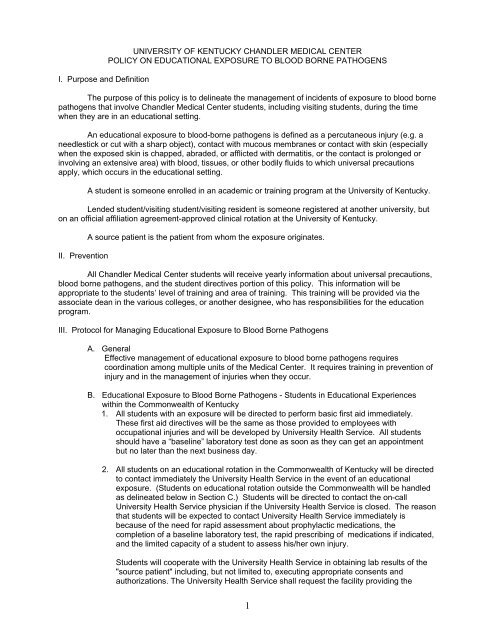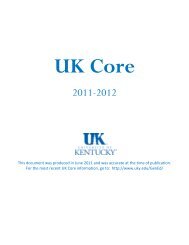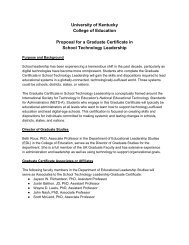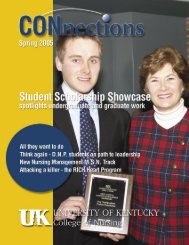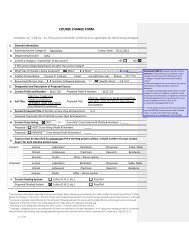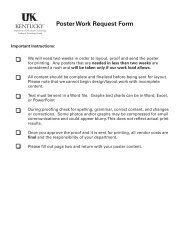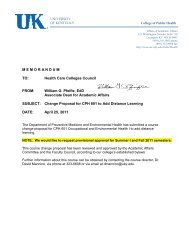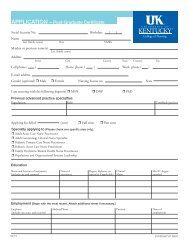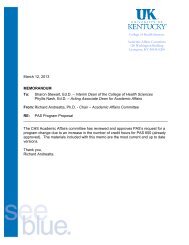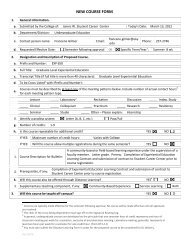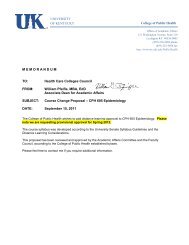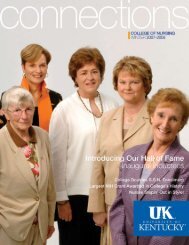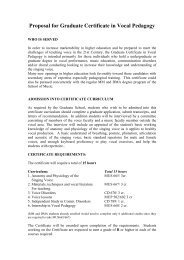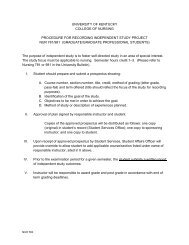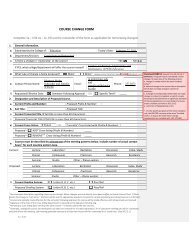05-06 Graduate Student Handbook.pdf - University of Kentucky
05-06 Graduate Student Handbook.pdf - University of Kentucky
05-06 Graduate Student Handbook.pdf - University of Kentucky
Create successful ePaper yourself
Turn your PDF publications into a flip-book with our unique Google optimized e-Paper software.
I. Purpose and Definition<br />
UNIVERSITY OF KENTUCKY CHANDLER MEDICAL CENTER<br />
POLICY ON EDUCATIONAL EXPOSURE TO BLOOD BORNE PATHOGENS<br />
The purpose <strong>of</strong> this policy is to delineate the management <strong>of</strong> incidents <strong>of</strong> exposure to blood borne<br />
pathogens that involve Chandler Medical Center students, including visiting students, during the time<br />
when they are in an educational setting.<br />
An educational exposure to blood-borne pathogens is defined as a percutaneous injury (e.g. a<br />
needlestick or cut with a sharp object), contact with mucous membranes or contact with skin (especially<br />
when the exposed skin is chapped, abraded, or afflicted with dermatitis, or the contact is prolonged or<br />
involving an extensive area) with blood, tissues, or other bodily fluids to which universal precautions<br />
apply, which occurs in the educational setting.<br />
A student is someone enrolled in an academic or training program at the <strong>University</strong> <strong>of</strong> <strong>Kentucky</strong>.<br />
Lended student/visiting student/visiting resident is someone registered at another university, but<br />
on an <strong>of</strong>ficial affiliation agreement-approved clinical rotation at the <strong>University</strong> <strong>of</strong> <strong>Kentucky</strong>.<br />
II. Prevention<br />
A source patient is the patient from whom the exposure originates.<br />
All Chandler Medical Center students will receive yearly information about universal precautions,<br />
blood borne pathogens, and the student directives portion <strong>of</strong> this policy. This information will be<br />
appropriate to the students’ level <strong>of</strong> training and area <strong>of</strong> training. This training will be provided via the<br />
associate dean in the various colleges, or another designee, who has responsibilities for the education<br />
program.<br />
III. Protocol for Managing Educational Exposure to Blood Borne Pathogens<br />
A. General<br />
Effective management <strong>of</strong> educational exposure to blood borne pathogens requires<br />
coordination among multiple units <strong>of</strong> the Medical Center. It requires training in prevention <strong>of</strong><br />
injury and in the management <strong>of</strong> injuries when they occur.<br />
B. Educational Exposure to Blood Borne Pathogens - <strong>Student</strong>s in Educational Experiences<br />
within the Commonwealth <strong>of</strong> <strong>Kentucky</strong><br />
1. All students with an exposure will be directed to perform basic first aid immediately.<br />
These first aid directives will be the same as those provided to employees with<br />
occupational injuries and will be developed by <strong>University</strong> Health Service. All students<br />
should have a “baseline” laboratory test done as soon as they can get an appointment<br />
but no later than the next business day.<br />
2. All students on an educational rotation in the Commonwealth <strong>of</strong> <strong>Kentucky</strong> will be directed<br />
to contact immediately the <strong>University</strong> Health Service in the event <strong>of</strong> an educational<br />
exposure. (<strong>Student</strong>s on educational rotation outside the Commonwealth will be handled<br />
as delineated below in Section C.) <strong>Student</strong>s will be directed to contact the on-call<br />
<strong>University</strong> Health Service physician if the <strong>University</strong> Health Service is closed. The reason<br />
that students will be expected to contact <strong>University</strong> Health Service immediately is<br />
because <strong>of</strong> the need for rapid assessment about prophylactic medications, the<br />
completion <strong>of</strong> a baseline laboratory test, the rapid prescribing <strong>of</strong> medications if indicated,<br />
and the limited capacity <strong>of</strong> a student to assess his/her own injury.<br />
<strong>Student</strong>s will cooperate with the <strong>University</strong> Health Service in obtaining lab results <strong>of</strong> the<br />
"source patient" including, but not limited to, executing appropriate consents and<br />
authorizations. The <strong>University</strong> Health Service shall request the facility providing the<br />
1


